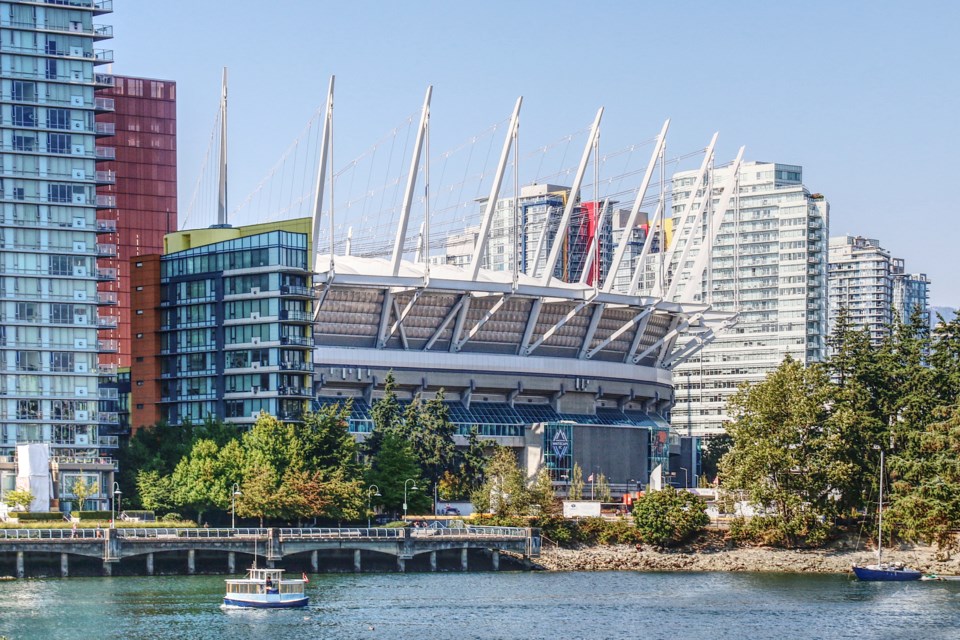The world’s biggest soccer event is coming to Vancouver in less than a year, prompting new discussion on whether the co-host city should temporarily ease short-term-rental (STR) restrictions given the city’s limited hotel supply.
Excitement is building, but so is pressure on officials to deliver a successful tournament, with seven matches planned for the 50,000-capacity BC Place stadium in June and July of next year.
Airbnb Inc. is anticipating 32,000 visitors for FIFA on its platform alone, and with 350,000 total spectators expected to fill BC Place, there is concern that the city’s 13,000 hotel rooms won’t be enough.
“We all remember Taylor Swift and the $1,500-a-night hotel rooms,” said Alex Howell, Airbnb’s policy lead for Canada.
“Nobody wants to see that again for FIFA, and so we’re willing to work with the City [of Vancouver] on relaxing some of those regulations, if that’s something that they’re open to.”
Non-soccer fans may want to get out of town and rent their homes for extra income, Howell said, but the “very strict” and complex regime makes it hard for people who just want to host for a couple of weeks.
It’s complicated and expensive to get an STR licence, she said, citing the city’s $1,060 annual fee for an STR business licence.
“A thousand dollars is a very expensive licence, especially for someone who’s only going to be able to host for a couple of weeks,” she said, also citing onerous documentation requirements.
Howell said the provincial government has given STR platforms the cold shoulder. “Unfortunately, at this time, they have not made themselves available,” she said.
STR platform Vrbo, owned by Expedia Group Inc., is also calling for a temporary easing of restrictions.
“We strongly advise increasing capacity and diversity of accommodation types available in Vancouver during the World Cup, including by temporarily expanding availability of short-term rentals,” said Hunter Doubt, Expedia’s head of government affairs for Canada.
“Maintaining a full spectrum of accommodations that can collectively absorb the expected surge in visitors around the event is critical for all host cities,” he said in a statement.
“This temporary change would also help to distribute tourism outside the city core, spreading this important economic opportunity across a broader area,” he added.
Royce Chwin, president and CEO of non-profit Destination Vancouver, said easing STR restrictions may not necessarily have much of an impact. He said there are about 20,000 hotel rooms in the region, and that doesn’t include legal STRs and informal stays.
“Family members from around the world are making those requests to stay on couches and [in] extra rooms,” he said.
FIFA’s initial bid process took into account the city’s accommodation capacity relative to stadium size and community size. “It was part of the bid package,” he said.
FIFA did not respond to BIV’s request for comment.
Chwin acknowledged that inventory may potentially be “tight” during parts of the tournament but that he’s not sure if calls to lift STR restrictions will solve anything. He added: “we do believe that there are generally enough rooms.”
Among major Canadian markets last year, Vancouver had the highest hotel occupancy rate at 78.2 per cent, according to Avison Young (Canada) Inc. The city’s average daily hotel rate was calculated at $285.21.
The City of Vancouver directed BIV’s inquiry to Destination Vancouver, while providing a statement about updates to its hotel policy earlier this year.
The new policy “includes significant measures to encourage more hotels to be developed through rezonings,” said the statement.
The B.C. government, meanwhile, is standing its ground.
A statement from the Ministry of Tourism, Arts, Culture and Sport said legal STRs remain available, and that reliable and efficient transit options will open up more of the region, including Vancouver Island, for World Cup visitors.
“This isn’t the first time Vancouver has hosted major events, such as the 2010 Winter Olympics, Invictus Games and the Grey Cup, and B.C. continues to be known worldwide for its hospitality and capability to host thousands of visitors during global events,” said the statement.
Destination Vancouver’s Chwin said he expects excitement to explode after the Dec. 5 final draw, when group-stage matches will be determined. That will reveal which teams will play in which cities.
Vancouver is among the most searched for host cities, he said, with visitors attracted to the city’s reputation for oceans, mountains, walkability and cleanliness. The other Canadian host city is Toronto, with additional matches in the U.S. and Mexico.
“It feels like you’re prepping for the biggest Thanksgiving dinner ever,” Chwin said. “All the lead-up, and then the next thing you know, it’s going to be the end of July and FIFA’s over.”




